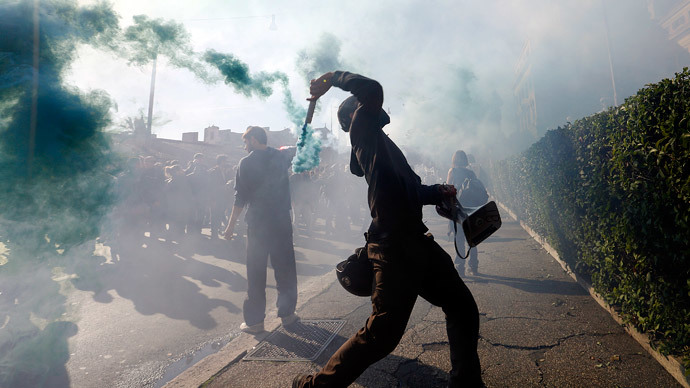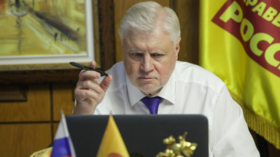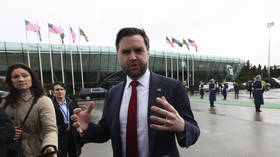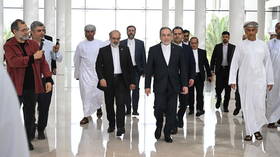Clashes with police as protests against austerity sweep Italy (PHOTOS, VIDEO)

Egg-throwing, red paint and police batons marked a fresh heating-up of countrywide protests over impending social reforms in Italy, as the striking political left was joined by other members of society in major cities.
Transportation chaos and injuries occurred in some of the country’s major commercial and cultural hubs – from Rome and Milan, through to Naples, Padua, Turin, Bergamo, Genoa, Pisa and Palermo.
The rallies are the latest in a series of protests over Prime Minister Matteo Renzi’s reforms – most notably the Jobs Act, which gives employers much more freedom to hire and fire employees. They are infuriating an increasingly large number of people amid an atmosphere of joblessness. There is also spillover into other complaints, including those directed at immigrants.
The largest gatherings took place in Milan, where riot police were attacked with flares, before charging the crowds with batons.
In Rome, enraged demonstrators scaled the Coliseum; others gathered in front of a refugee center, which has been under attack throughout the week amid a climate of rampant unemployment and recrimination. Some 36 teenage refugees were evacuated.
Elsewhere in the capital, security forces got pelted with eggs and covered in red paint outside the German embassy. One opposition leader shouted they were demonstrating against the “politics of austerity.” A similar scene took place in front of the Economy Ministry.
The 500-strong Padua rally resulted in four police being injured, including their local chief Marco Cali, according to the Corriere della Sera. Around the Piazza Mazzini, they attempted to breach a blockade to access the Democratic Party’s offices.
Countrywide, striking by unions has paralyzed transport services in some of the major cities, including Rome.

Apart from the major hubs, picket lines appeared in 20 other towns, backed by the Cub, Usi and ADL Cobas unions, among others.
Cobas spokesman Piero Bernocchi also referred to “politics of austerity,” as well as “liberalism,” adding in a statement: “No to the politics of Renzi’s government and the EU, no to the Jobs Act, the Stability Bill, the school plans and the Unblock Italy decree.”
The leader of another union, FIOM’s Maurizio Landini, was happy with the turnout in Milan, a month after one million disgruntled workers took to the capital’s streets.
"We will continue until they change their position," he said, addressing the public in front of the city’s imposing Gothic cathedral. "We don't just want to oppose things. We want to change the country."
The proposed government reforms have been drawing hundreds of thousands of Italians onto the streets since October. They are taking place amid a decline in large industrial firms and dwindling public services. The reforms are expected to pass parliament by the end of the year.
The political left is in uproar, seeing the PM’s move as a deliberate attack on one of their central tenets. This led to strikes being organized by metalworkers from the FIOM-GGIL union.

As everyone else who marched on Friday, they want higher pensions, a guaranteed minimum wage and greater investment in public services, as well as an increase in housing rights.
Under the proposed new laws, Renzi wants to impose limits on any firm with more than 15 employees on the payroll; they would not be able to regain their jobs or take their employer to court over wrongful termination. Currently, the only positive aspect of this is a small payoff after sacking.
Workers on short-term contracts would also experience a massive decrease in job security following the changes.
The main focus is on Article 18, which includes a rule on job protection that the PM has been trying to alter since taking office in February.
Italy was one of the EU members hit hardest by the recession, and still hasn’t recovered. Joblessness is also exacerbated by some of the highest corruption levels in Europe.
The PM needs to press on with the reforms if he wants to get more spending freedom from the EU.
The unions said they will continue to strike. Their next walkout is slated for December 5.
Milan,Torino, Padova, Rome... dozens of cities take to the streets in #Italy for the #SocialStrike#scioperosocialepic.twitter.com/skniOD1aGj
— 15MBcn_int (@15MBcn_int) November 14, 2014













